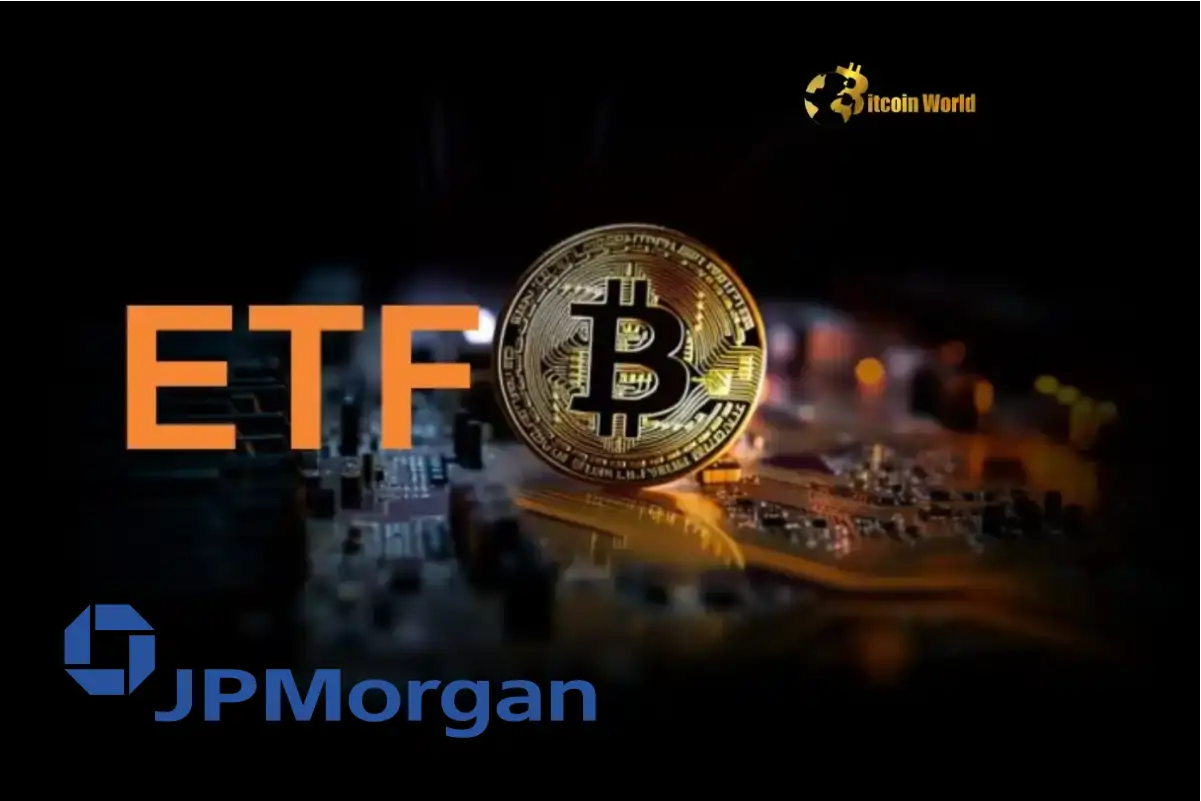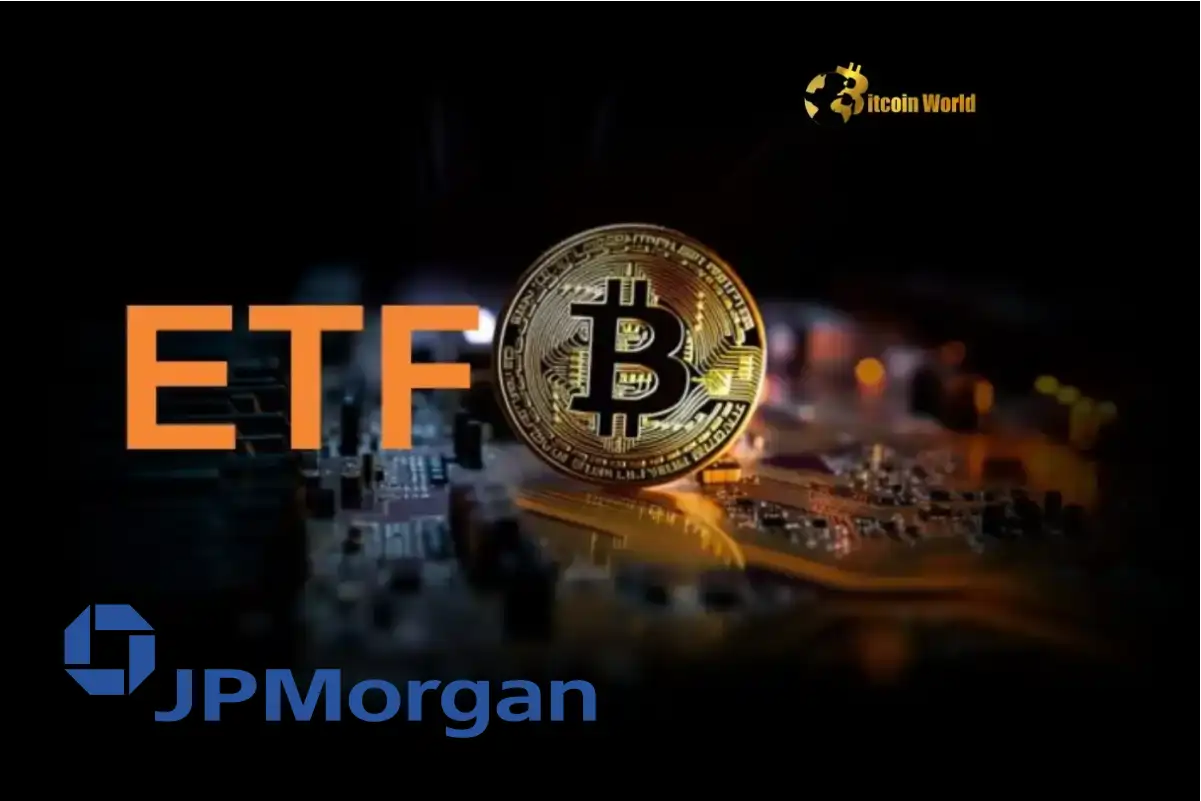Prepare for a deep dive into the evolving relationship between traditional finance giants and the world of digital assets. Recent reports suggest that American investment banking behemoth, JPMorgan, is significantly increasing its exposure to Bitcoin ETF products, with holdings reportedly approaching a staggering $1.7 billion. This development, shared by crypto commentator Crypto Rover on X, points towards a growing trend of Institutional Bitcoin adoption, a narrative that has gained considerable momentum since the approval of spot Bitcoin ETFs in the United States.
Unpacking the News: What Are JPMorgan’s Reported Holdings?
According to the information shared, JPMorgan’s substantial exposure is primarily concentrated in two leading spot Bitcoin ETFs: BlackRock’s iShares Bitcoin Trust (IBIT) and Fidelity’s Wise Origin Bitcoin Fund (FBTC). While specific details regarding the exact breakdown between IBIT FBTC holdings were not immediately available in the initial report, the combined figure signals a significant commitment from one of the world’s most influential financial institutions. This move is particularly noteworthy given JPMorgan CEO Jamie Dimon’s historically skeptical stance on Bitcoin, highlighting a potential shift in the bank’s strategy regarding digital assets, or at least its willingness to facilitate client access to the asset class through regulated investment vehicles.
Let’s consider the context:
- Spot Bitcoin ETFs were launched in the U.S. in January 2024.
- They allow investors to gain exposure to Bitcoin’s price movements without directly owning the cryptocurrency.
- Major financial players like BlackRock and Fidelity launched their own ETFs, quickly accumulating billions in assets under management (AUM).
- JPMorgan, as a prime broker and wealth manager, is positioned to facilitate client access to these new investment products.
The reported Bitcoin ETF Holdings by JPMorgan could represent proprietary trading, client investments facilitated by the bank, or a combination of both. Regardless of the exact allocation, the sheer magnitude of the reported figure underscores the increasing comfort level and demand within traditional finance for regulated Bitcoin investment avenues.
Why is JPMorgan’s Involvement in Bitcoin ETFs So Significant?
JPMorgan Chase & Co. is not just any bank; it’s a global leader in financial services, with vast assets under management and deep ties to institutional and high-net-worth investors. Their reported large-scale engagement with Bitcoin ETF products sends a powerful signal to the market for several reasons:
- Validation: Despite previous skepticism from its leadership, JPMorgan’s substantial holdings lend a degree of legitimacy and validation to Bitcoin as an asset class in the eyes of mainstream finance.
- Accessibility: By holding and potentially offering access to IBIT and FBTC, JPMorgan makes it easier for its vast network of clients, including large institutions and wealthy individuals, to gain exposure to Bitcoin.
- Liquidity and Market Depth: Large purchases by institutions like JPMorgan contribute to the liquidity and overall market depth of Bitcoin ETFs, potentially making them more attractive to other large investors.
- Trend Indicator: This move could be indicative of a broader trend among other major banks and financial institutions that are now more willing to engage with crypto assets through regulated products.
For years, the crypto community eagerly awaited the arrival of institutions. This reported development with JPMorgan, coupled with the success of ETFs like IBIT and FBTC, suggests that institutional adoption is not just coming; it’s already here in a meaningful way.
The Role of IBIT and FBTC in Driving Institutional Bitcoin Adoption
BlackRock’s IBIT and Fidelity’s FBTC have quickly emerged as frontrunners in the U.S. spot Bitcoin ETF market. Their success is not accidental. Backed by the reputations and distribution networks of their parent companies, these ETFs have attracted significant inflows since their launch. JPMorgan’s reported IBIT FBTC holdings are a direct consequence of the success and accessibility offered by these specific products.
What makes these ETFs attractive to institutions?
- Regulatory Clarity: Operating within a regulated framework (like the U.S. exchange-traded fund structure) provides a level of comfort that direct Bitcoin ownership might not for many institutions.
- Ease of Access: ETFs trade on traditional stock exchanges, making them easy to buy and sell through existing brokerage accounts and infrastructure.
- Custody Handled: The ETF structure handles the complexities and risks associated with directly holding and securing Bitcoin.
- Liquidity: High trading volumes in ETFs like IBIT and FBTC ensure that large positions can be entered or exited relatively easily.
The reported size of JPMorgan’s Bitcoin ETF Holdings highlights the effectiveness of the ETF structure in bridging the gap between traditional finance and digital assets, facilitating significant Institutional Bitcoin investment.
Comparing Institutional Stances: Is JPMorgan an Outlier?
While JPMorgan’s reported $1.7 billion figure is substantial and attention-grabbing, they are not the only major financial institution engaging with Bitcoin ETFs. Other banks and investment firms have also disclosed holdings in their regulatory filings. However, the size attributed to JPMorgan in this report positions them among the more significant players currently reported.
Historically, major banks have held varying stances on Bitcoin:
| Institution | Historical Stance (General) | Current Engagement (Post-ETF) |
|---|---|---|
| JPMorgan | Often skeptical (CEO Jamie Dimon) | Reported significant Bitcoin ETF Holdings (IBIT, FBTC) |
| BlackRock | Shifted from cautious to proactive (launched IBIT) | Leading spot Bitcoin ETF provider |
| Fidelity | Early explorer of crypto, offered custody | Leading spot Bitcoin ETF provider (FBTC) |
| Goldman Sachs | Explored crypto trading/services | Offering some crypto-related services, likely facilitating ETF access |
| Morgan Stanley | Offered limited Bitcoin exposure to clients | Likely facilitating client access to ETFs |
This table illustrates that while direct holdings vary, the trend towards facilitating access to Institutional Bitcoin via ETFs is widespread among major financial players. JPMorgan’s large reported position underscores the potential scale of this trend.
What Does This Level of Bitcoin ETF Holdings Mean for the Market?
The accumulation of significant Bitcoin ETF Holdings by institutions like JPMorgan has several potential implications for the broader crypto market:
- Increased Demand: Large institutional buys create consistent demand pressure on Bitcoin, as ETF providers purchase BTC to back the shares bought by investors.
- Price Impact: Sustained institutional demand can contribute positively to Bitcoin’s price, especially as supply is limited (e.g., via the halving events).
- Reduced Volatility (Potentially): As more long-term focused institutional capital enters the market via ETFs, it could potentially lead to a more stable market structure over time, although Bitcoin is known for its volatility.
- Further Adoption: JPMorgan’s move might encourage other hesitant institutions to explore Crypto Institutional Adoption, creating a virtuous cycle of mainstream acceptance.
- Integration with Traditional Finance: It accelerates the integration of Bitcoin into traditional investment portfolios and financial planning.
While it’s crucial to remember that market movements are influenced by many factors, the scale of institutional engagement through ETFs like IBIT and FBTC is undoubtedly a major bullish factor for Bitcoin’s long-term outlook.
Actionable Insights for Investors
What can individual investors glean from this news about JPMorgan Bitcoin ETF holdings and the broader trend of Institutional Bitcoin adoption?
- Monitor Institutional Flows: Keep an eye on reports and regulatory filings (like 13F forms in the U.S.) that disclose institutional holdings in Bitcoin ETFs. These can provide insights into the pace and scale of adoption.
- Understand the ETF Mechanism: Recognize that buying a Bitcoin ETF is different from owning Bitcoin directly. While it offers convenience, you don’t control the private keys.
- Consider Your Own Strategy: If institutions are adding Bitcoin exposure, evaluate whether it fits within your own investment strategy and risk tolerance. ETFs like IBIT and FBTC offer regulated ways to do this.
- Diversification: Bitcoin is still a volatile asset. Even with institutional backing, it’s essential to approach it as part of a diversified portfolio.
- Stay Informed: The landscape of Crypto Institutional Adoption is rapidly changing. Follow reliable news sources to stay updated on regulatory developments, new products, and institutional moves.
The fact that a titan like JPMorgan is reportedly holding significant Bitcoin ETF Holdings underscores the shift in how the financial world views this asset class. It’s moving from the fringes to becoming a legitimate, albeit still evolving, part of the global financial ecosystem.
Challenges and Considerations in Institutional Bitcoin Adoption
While the news about JPMorgan and the success of ETFs like IBIT and FBTC are overwhelmingly positive for the narrative of Institutional Bitcoin, it’s important to acknowledge that challenges remain:
- Regulatory Uncertainty: While spot Bitcoin ETFs are approved in the U.S., the global regulatory landscape for cryptocurrencies is still fragmented and evolving. Future regulations could impact institutional strategies.
- Market Volatility: Bitcoin remains a highly volatile asset. Institutions must navigate significant price swings, which can impact their portfolio performance and risk management.
- Custody and Security (for direct holders/providers): While ETFs handle custody for the end investor, the underlying security of the Bitcoin held by ETF providers remains a critical consideration.
- Public Perception: Despite growing acceptance, skepticism about cryptocurrencies persists in some traditional financial circles and among the general public.
These challenges mean that the path of Crypto Institutional Adoption, while promising, may not always be smooth. However, the reported actions of major players like JPMorgan suggest a commitment to navigating these complexities.
Looking Ahead: The Future of Institutional Bitcoin ETF Holdings
The current trajectory suggests that Bitcoin ETF Holdings by institutions are likely to continue growing. As more financial advisors and wealth managers become comfortable recommending these products, and as more institutions allocate capital, the inflows into ETFs like IBIT and FBTC could increase further.
Potential future developments include:
- More banks and institutions disclosing significant holdings.
- Increased integration of Bitcoin ETFs into traditional investment platforms and model portfolios.
- Potential approval of other crypto-related ETFs (e.g., spot Ethereum ETFs), further expanding the avenues for Crypto Institutional Adoption.
- Greater research and analysis of Bitcoin as an asset class from traditional financial research desks.
The reported $1.7 billion figure for JPMorgan is not just a number; it’s a data point illustrating a significant shift in the financial landscape. It signifies that Bitcoin, through regulated products, is increasingly becoming a part of the institutional investment conversation and portfolio allocation.
Conclusion: A New Era of Institutional Engagement
The news that JPMorgan’s Bitcoin ETF Holdings are reportedly nearing $1.7 billion, concentrated in prominent funds like BlackRock’s IBIT and Fidelity’s FBTC, marks a pivotal moment in the journey of Institutional Bitcoin adoption. It underscores the effectiveness of the ETF structure in providing a bridge between the traditional financial world and the burgeoning digital asset space. While challenges remain, the willingness of a financial titan like JPMorgan to accumulate such substantial positions signals growing confidence and acceptance of Bitcoin as a legitimate asset class. This trend of Crypto Institutional Adoption is poised to reshape the market, bringing increased liquidity, validation, and potentially greater stability over the long term. For investors, it highlights the increasing accessibility of Bitcoin exposure through regulated and familiar investment vehicles, solidifying its place in the modern financial ecosystem.
To learn more about the latest crypto market trends, explore our article on key developments shaping Bitcoin institutional adoption.






